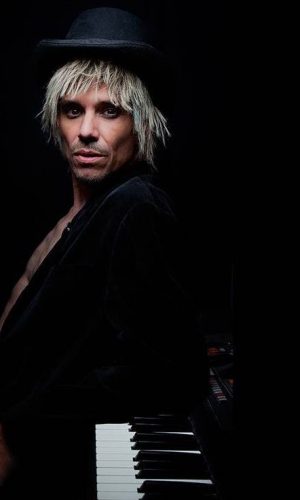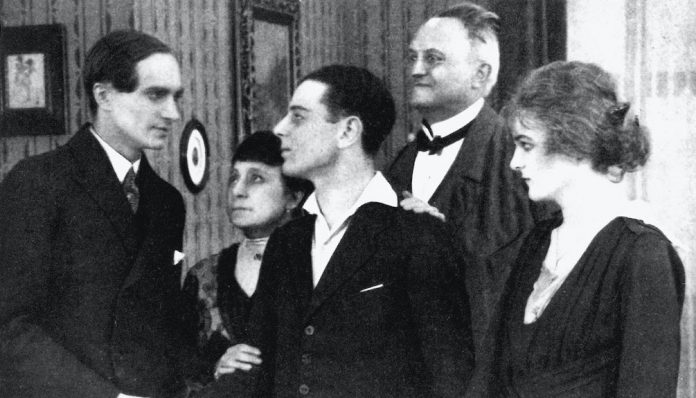[This article appears in the November/December 2019 issue of Boston Spirit magazine. Subscribe for free today.]
A rare opportunity to see a silent classic movie with a gay theme—and live piano accompaniment by Provincetown favorite Billy Hough—hits a Boston-area big screen on Thursday, Dec. 5 at the historic Strand Theatre in Dorchester.
“Different from the Others—which screens at 7:30 p.m, is preceded by a VIP cocktail reception at 5:30 p.m. and followed by a panel discussion—a fundraiser for the Provincetown Film Society and The Trevor Project.
Click here for tickets ($25, $20 for students, and $75 VIP).
When the Provincetown Film Society was planning a celebration of the 100-year anniversary of cinema in the town’s Whaler’s Wharf location (now the Waters Edge Cinema), any number of silent classics or recent LGBT films would have been suitable. But when organizers discovered the recently restored silent German film from 1919, it ended up being the perfect fit.
“Different from the Others” isn’t just any silent movie. It’s considered the earliest surviving feature film about LGBT people, and the only LGBT-themed movie from Germany’s progressive Weimar era (roughly 1918–1933) that survived destruction after Hitler took power. Directed by Richard Oswald and co-written with psychologist and gay rights pioneer Dr. Magnus Hirschfeld, who ran the Institute for Sexual Science, the film stars Conrad Veidt, a German actor whose best-known roles include the somnambulist in the “The Cabinet of Dr. Caligari” (1920) and Major Strasser in “Casablanca” (1942), made after he’d fled Nazi Germany and emigrated to the US.
Veidt plays Paul Körner, a successful violinist whose romance with handsome male student Kurt Sivers (Fritz Schulz) is threatened when a blackmailer, Franz Bollek (Reinhold Schunzel) threatens to expose the relationship and Körner’s homosexuality, then a crime under Germany’s notorious Paragraph 175 (which was the film’s original title). Enacted in 1871, the German criminal code’s Paragraph 175 sentenced thousands of accused German homosexual men to jail terms for “unnatural vice between men.” Unlike nearly every other LGBT-themed film until the modern era, “Different from the Others” portrays homosexuality in general and the gay couple in particular sympathetically. It blames homophobia, represented by Paragraph 175, for the characters’ tragic outcome, not their sexual orientation.
The film opened in the summer of 1919 to sold-out houses across Germany. It is credited with sparking the elimination of censorship laws that allowed artists to create works about formerly forbidden subjects. But shortly after its release, “Different from the Others” stirred controversy, and by 1920 censorship had returned and the film was banned. After the Nazis came to power, they burned the film and it was believed lost for more than 40 years.
In 2012 the Outfest-UCLA Legacy Project, which is dedicated to preserving moving images with LGBT themes, took what footage had survived from the sole original 35mm print of the film and restored the film. Since much of the original footage was missing, the restoration included new English intertitles and the addition of recently found photos and film stills.
“Different from the Others” was chosen by Outfest for restoration because “we have so little representation of the early queer community,” says Todd Wiener, Motion Picture Archivist at the UCLA Film and Television Archive.
The PFS screening of “Different from the Others” was viewed as a celebration of film and LGBT history. “The story highlights the notorious law that had been on the books since the 1870s,” says Christine Walker, PFS executive director. “Shockingly, the film and the story are still relevant.”
“Different from the Others” screened in June at the 60-seat Hawthorne Barn in Provincetown as part of the Twenty Summers program. The screening quickly sold out and Walker immediately wanted to take the program on the road to a larger venue so more audiences could experience it.
Boston gets its opportunity at the December 5 Strand Theatre in Dorchester screening.
The Strand was built in 1912. “When we visited, we felt it was the ideal venue,” says Walker.

There’s also live music. For the “Different from the Others” Provincetown screening, Walker immediately thought of Provincetown favorites Billy Hough and Sue Goldberg to compose and perform a soundtrack. Their band “Scream Along with Billy” has performed to enthusiastic crowds in Provincetown since 2006. Hough and Goldberg signed on right away, says Walker, and “created a score that is so moving and beautiful. It nods to the 1920s but still brings it into a modern context.” Goldberg was not available for the Strand event, but Hough will perform a live set with the collaboration of a vocal ensemble including Grammy-winning tenor Jason McStoots.
Not a subscriber? Sign up today for a free subscription to Boston Spirit magazine, New England’s premier LGBT magazine. We will send you a copy of Boston Spirit 6 times per year and we never sell/rent our subscriber information. Click HERE to sign up!









